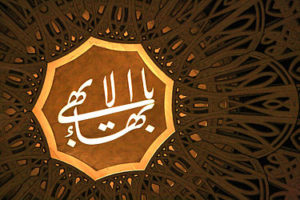
The Ringstone symbol represents humanity’s connection to God. Picture Credit: Wikipedia
World Religion Day is an observance initiated in 1950 by the National Spiritual Assembly of the Bahá’ís of the United States, celebrated worldwide on the third Sunday in January each year. Though initiated in the United States, World Religion Day has come to be celebrated internationally.
Its purpose is to promote the idea that the spiritual principles underlying the world’s religions are harmonious, and to suggest that religions play a role in unifying humanity. In April 2002, the Universal House of Justice published a letter “To the World’s Religious Leaders”, in which it was stated that:
Interfaith discourse, if it is to contribute meaningfully to healing the ills that afflict a desperate humanity, must now address honestly … the implications of the over-arching truth … that God is one and that, beyond all diversity of cultural expression and human interpretation, religion is likewise one.

Calligraphy of the Greatest Name.
The Bahá’í Faith is a monotheistic religion which emphasizes the spiritual unity of all humankind. Three core principles establish a basis for Bahá’í teachings and doctrine: the unity of God, that there is only one God who is the source of all creation; the unity of religion, that all major religions have the same spiritual source and come from the same God; and the unity of humanity, that all humans have been created equal, coupled with the unity in diversity, that diversity of race and culture are seen as worthy of appreciation and acceptance. According to the Bahá’í Faith’s teachings, the human purpose is to learn to know and to love God through such methods as prayer, reflection, and being of service to humanity.
The Bahá’í Faith was founded by Bahá’u’lláh in 19th-century Persia. Bahá’u’lláh was imprisoned and exiled from Persia to the Ottoman Empire because of his association with the Babi movement. He was still officially under house arrest at the time of his death, more than forty years later. Under the leadership of his son, `Abdu’l-Bahá, the religion gained a footing in Europe and America, but it still suffers intense persecution where it originated, in present-day Iran. After the death of `Abdu’l-Bahá, the leadership of the Bahá’í community entered a new phase, evolving from a single individual to an administrative order with both elected bodies and appointed individuals. It is estimated that there are more than 5 million Bahá’ís around the world in more than 200 countries and territories.
According to Bahá’í doctrine, religious history is seen to have unfolded through a series of divine messengers, each of which established a religion that was suited to the needs of the time and to the capacity of the people. Baha’i scripture specifically mentions Abrahamic figures such as Moses, Jesus, and Muhammad; other Bahá’í literature mentions figures from Dharmic religions like Krishna, Buddha, and others. For Bahá’ís, the most recent messengers are the Báb and Bahá’u’lláh. In Bahá’í belief, each consecutive messenger prophesied of messengers to follow, and Bahá’u’lláh’s life and teachings fulfilled the end-time promises of previous scriptures. Humanity is understood to be in a process of collective evolution, and the need of the present time is for the gradual establishment of peace, justice and unity on a global scale.
Three core principles establish a basis for Bahá’í teachings and doctrine: the unity of God, the unity of religion, and the unity of humanity. From these postulates stems the belief that God periodically reveals his will through divine messengers, whose purpose is to transform the character of humankind and to develop, within those who respond, moral and spiritual qualities. Religion is thus seen as orderly, unified, and progressive from age to age.
The Bahá’í writings describe a single, personal, inaccessible, omniscient, omnipresent, imperishable, and almighty God who is the creator of all things in the universe. The existence of God and the universe is thought to be eternal, without a beginning or end. Though inaccessible directly, God is nevertheless seen as conscious of creation, with a will and purpose that is expressed through messengers termed Manifestations of God.
Bahá’í teachings state that God is too great for humans to fully comprehend, or to create a complete and accurate image of, by themselves. Therefore, human understanding of God is achieved through his revelations via his Manifestations. In the Bahá’í religion, God is often referred to by titles and attributes (for example, the All-Powerful, or the All-Loving), and there is a substantial emphasis on monotheism; such doctrines as the Trinity are seen as compromising, if not contradicting, the Bahá’í view that God is single and has no equal. The Bahá’í teachings state that the attributes which are applied to God are used to translate Godliness into human terms and also to help individuals concentrate on their own attributes in worshipping God to develop their potentialities on their spiritual path. According to the Bahá’í teachings the human purpose is to learn to know and love God through such methods as prayer, reflection, and being of service to others.
The following principles are frequently listed as a quick summary of the Bahá’í teachings. They are derived from transcripts of speeches given by `Abdu’l-Bahá during his tour of Europe and North America in 1912. The list is not authoritative and a variety of such lists circulate.
• Unity of God
• Unity of religion
• Unity of humanity
• Unity in diversity
• Equality between men and women
• Elimination of all forms of prejudice
• World peace and a New world order
• Harmony of religion and science
• Independent investigation of truth
• Principle of Ever-Advancing Civilization
• Universal compulsory education
• Universal auxiliary language
• Obedience to government and non-involvement in partisan politics unless submission to law amounts to a denial of Faith.
• Elimination of extremes of wealth and poverty
• Spiritual solutions to economic problems
With specific regard to the pursuit of world peace, Bahá’u’lláh prescribed a world-embracing collective security arrangement as necessary for the establishment of a lasting peace.

Speak Your Mind